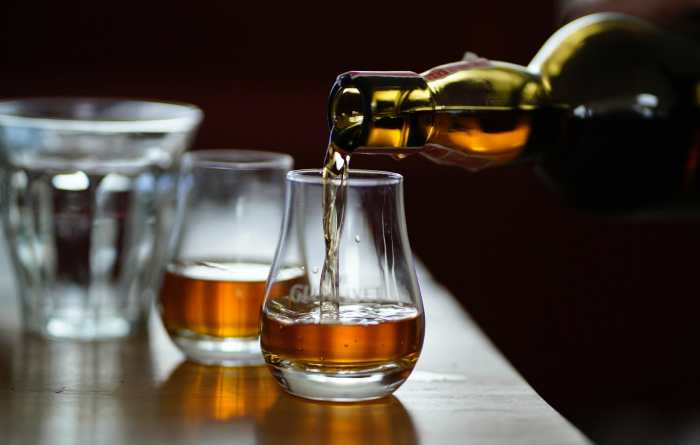Serving Sizes and Nutritional Implications

Scotch whisky nutrition facts – Scotch whisky, a distilled spirit, offers a unique flavor profile but contributes minimal nutritional value. Understanding serving sizes and their implications is crucial for responsible consumption and maintaining overall health. While not a significant source of vitamins or minerals, the caloric content and potential alcohol-related health risks warrant attention.
The nutritional profile of Scotch whisky is primarily defined by its alcohol content and, to a lesser extent, any added sugars or flavorings. Pure Scotch whisky contains almost exclusively ethanol and water. Therefore, variations in nutritional content primarily stem from differences in serving size.
Scotch Whisky Nutritional Content Across Serving Sizes, Scotch whisky nutrition facts
The following table illustrates the approximate nutritional content of Scotch whisky across different serving sizes. Note that these values are estimates and can vary slightly depending on the specific brand and bottling. These figures assume a standard 40% ABV (alcohol by volume).
| Serving Size (oz) | Calories (approx.) | Carbohydrates (g) | Protein (g) | Fat (g) |
|---|---|---|---|---|
| 1 | 64 | 0 | 0 | 0 |
| 1.5 | 96 | 0 | 0 | 0 |
| 2 | 128 | 0 | 0 | 0 |
Responsible Consumption Guidelines
Moderate alcohol consumption is key to minimizing potential health risks associated with Scotch whisky. Guidelines vary by region, but generally advise limiting intake to no more than one to two standard drinks per day for men and one standard drink per day for women. A standard drink is typically defined as 1.5 oz of 40% ABV spirits. Exceeding these limits can increase the risk of liver damage, heart disease, certain cancers, and other health problems.
Scotch whisky, while calorically dense due to its alcohol content, offers negligible nutritional value beyond empty calories. A stark contrast emerges when considering the sugar load in other beverages; for example, understanding the sheer quantity of sugar in a 2-liter bottle requires checking the pepsi nutrition facts 2 liter data. This highlights the significant difference in nutritional profiles, emphasizing that scotch whisky’s nutritional contribution is primarily caloric, unlike the substantial sugar content found in many soft drinks.
Impact of Mixers on Nutritional Profile
Adding mixers to Scotch whisky significantly alters its nutritional profile. For example, mixing with sugary sodas or juices drastically increases the caloric and carbohydrate content. A simple highball with soda water adds minimal calories, while a whisky sour with lemon juice and simple syrup will contain substantially more sugar and calories. Choosing low-calorie mixers, such as soda water or diet tonic, helps minimize the overall nutritional impact.
Misconceptions about Scotch Whisky Nutrition: Scotch Whisky Nutrition Facts

Scotch whisky, often enjoyed as a sophisticated beverage, is frequently surrounded by misconceptions regarding its nutritional content and potential health impacts. These misunderstandings often stem from a lack of clear information and the romanticized image surrounding the spirit. Clarifying these points is crucial for responsible consumption and informed decision-making.
Scotch Whisky’s Caloric Content and Weight Gain
A common misconception is that Scotch whisky contributes significantly to weight gain due to its high caloric content. While it’s true that alcohol provides calories (approximately 7 calories per gram), the amount in a standard serving of Scotch whisky is relatively modest compared to other alcoholic beverages or high-calorie foods. A single serving (typically 1.5 ounces or 44ml) contains roughly 100-120 calories.
Weight gain is primarily determined by an overall caloric imbalance – consuming more calories than are expended – rather than the isolated contribution of a single alcoholic drink. Therefore, moderate consumption of Scotch whisky, as part of a balanced diet and active lifestyle, is unlikely to be a major contributor to weight gain.
Scotch Whisky and Liver Health
Another misconception is that Scotch whisky invariably damages the liver. While excessive alcohol consumption can certainly lead to liver disease (cirrhosis, alcoholic hepatitis), moderate drinking is not necessarily detrimental to liver health. Indeed, some studies have even suggested potential benefits of moderate alcohol consumption on cardiovascular health, although more research is needed in this area and the benefits must be weighed against the risks of alcohol consumption.
The key is moderation. The damage to the liver is dose-dependent; high levels of consumption, over prolonged periods, pose a far greater risk than moderate, occasional consumption.
Scotch Whisky and “Empty Calories”
The idea that Scotch whisky provides “empty calories” is a frequently heard claim. While it’s true that Scotch whisky doesn’t offer significant amounts of vitamins or minerals, the term “empty calories” is somewhat misleading. Calories from any source, including alcohol, contribute to energy intake. However, framing Scotch whisky’s calories as “empty” ignores the potential enjoyment and social benefits associated with moderate consumption.
The overall nutritional impact of any food or beverage should be considered within the context of a balanced diet.
Scotch Whisky as a Source of Antioxidants
Some claim that Scotch whisky possesses significant antioxidant properties. While Scotch whisky does contain some compounds with antioxidant potential, the concentration is unlikely to be high enough to offer substantial health benefits. The antioxidant capacity of Scotch whisky is far outweighed by the potential risks associated with alcohol consumption. Relying on Scotch whisky as a primary source of antioxidants is not advisable.
A balanced diet rich in fruits, vegetables, and other antioxidant-rich foods is a far more effective strategy.
Helpful Answers
Does Scotch whisky have any vitamins or minerals?
Nope, pretty much none. It’s mostly water, alcohol, and trace amounts of congeners (flavor compounds).
Is Scotch whisky fattening?
The calories are primarily from alcohol, not fat. However, excessive consumption can lead to weight gain due to the high caloric content of alcohol itself.
Does the type of Scotch (single malt vs. blended) affect nutrition?
Minimal differences exist. The nutritional profile is largely determined by the alcohol content, not the specific type.
Can I drink Scotch whisky if I’m on a low-carb diet?
It’s very low in carbs, but remember the calories still count! Moderation is key.
